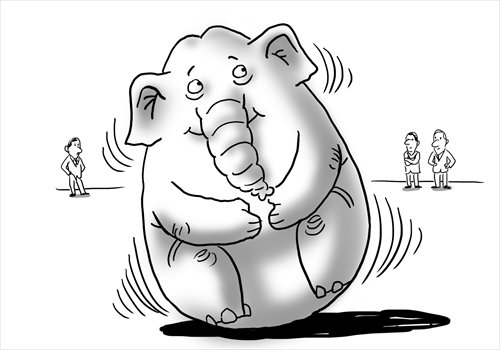New Delhi may get dragged into tussles

Illustration: Liu Rui/GT
On April 18, the foreign ministers of China, Russia and India met in Moscow for the 14th trilateral foreign ministers meeting and issued a joint communiqué. The three countries promised to maintain maritime order based on international law and agreed that all disputes should be solved through negotiations by claimant countries. The communiqué stated a common stance toward the simmering tensions in the South China Sea and showed their expectation for a negotiated result to solve territorial disputes.
Having established a comprehensive strategic partnership of coordination, China-Russia relations have warmed up in the past two years and Russia has expressed understanding and support for China's stance in the South China Sea. But India's attitude is tricky.
Indian diplomacy rests on engagement with major world powers instead of clinging to a particular country. By adopting an ambiguous strategy, India places itself in a position that all the major powers woo it, but it never explicitly promises anything regarding the policies of other nations.
This makes these countries hope about wooing India while not willing to break ties with it due to its ambiguous stance. India has been trying to maximize its interests with minimum costs, which so far has achieved satisfying results.
For years, India has remained a prudent yet ambiguous stance over the South China Sea issue. At a sensitive moment such as now, India expressed the same attitude as China and Russia, indicating a changing state of mind of India. Why is the case?
One possible reason is that India has been striving for full-fledged membership of the Shanghai Cooperation Organization (SCO). In July 2015, the SCO Ufa summit launched the process of accession for India and Pakistan. But India's inclusion into the SCO has not been completed. India needs to prove that its accession can play a constructive role for the unity of SCO members and the international effect of the SCO.
In addition, what rights India will be entitled to after it enters the SCO will be determined by the existing members. Against this backdrop, India taking a consistent stance with China and Russia in diplomatic matters will facilitate its accession to the SCO and help it better play its role within this regional framework.
This may be part of India's consideration. It's noteworthy that days before the joint communiqué, US Secretary of Defense Ashton Carter announced that the US and India agreed in principle to share military logistics during his tour in India on April 10-12. His Indian counterpart Manohar Parrikar said the two countries will sign an agreement in a few months. The signing will mark a considerable change in India's foreign policy, a big step in binding the two at least in military cooperation. The agreement doesn't necessarily mean to target China or Russia, but it definitely pleases neither.
By joining the communiqué in support of China's stance on the South China Sea, India seemingly tries to strike a diplomatic balance at a high level. Yet it doesn't connote any change in India's diplomatic intentions to seek a balance between powers. India's moves to substantively bolster the US in military cooperation and meanwhile disappoint the latter right before the South China Sea arbitration outcome is released indicates the duality of India's policy. They show that India also takes a two-sided stance in dealing with China.
India's moves of this kind are not unwise. But to keep doing it in a changing world is not easy, and instead will satisfy no power that wants to rope in India. While India has to take a stance in coping with powers to get its anticipated gains, it may end up in being involved in tussles that it originally wants to stay away from. From this perspective, it is fair to question whether India's practice is indeed commendable.
The author is a professor at the Guangdong Research Institute for International Strategies. opinion@globaltimes.com.cn Follow us on Twitter @GTopinion